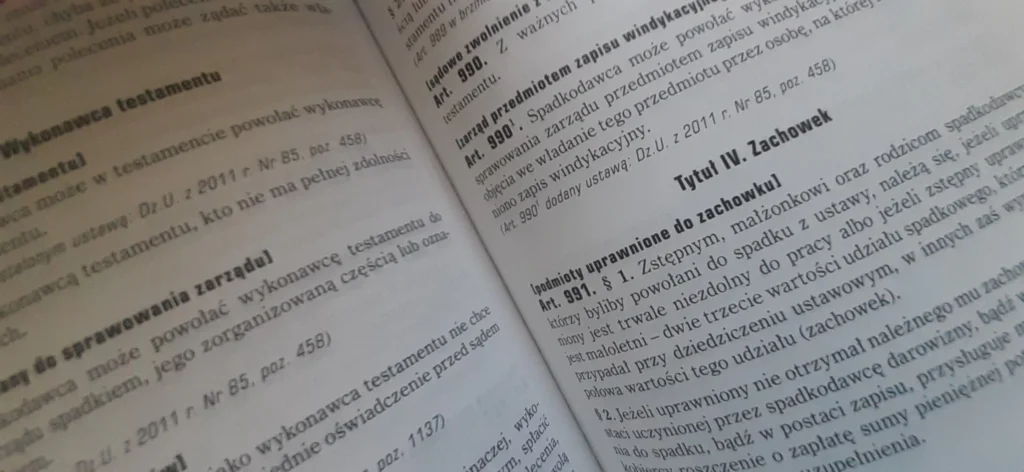If you would have been eligible for inheritance in Poland had the deceased died intestate, but were omitted from the will, you may still be entitled to a portion of the estate known as the “zachowek” – in English, the legitime. How does it work? Let me explain.
Polish inheritance law specifies who is designated as an heir when a person dies without leaving a will (for more details, click here: Inheritance in Poland). In summary, if the deceased died intestate, the primary heirs are the spouse and descendants. In the absence of descendants, part of the inheritance (in the absence of descendants and spouse – all of it) passes to the parents and the parents’ descendants. However, when a valid will is present, the estate is distributed according to its terms, which can sometimes result in close family members receiving nothing. To mitigate this, Polish law provides for the legitime.
What is a legitime (zachowek)?
The legitime is a monetary compensation designed to ensure that close family members – namely descendants, the spouse, and, in certain circumstances, the parents – receive a fair share of the inheritance even if they are omitted from the will. Generally, the amount awarded as a legitime equals half of what one would have inherited if the deceased had died intestate. However, if a person eligible for the legitime is a minor or suffers from a permanent disability that hinders their ability to work, they are entitled to two-thirds of that amount.
Example. Jan – a widower and father of two adult children – dies. He leaves a will directing that his entire estate (valued at 100,000 PLN) be left to his girlfriend. Had Jan died without a will, his two children would have inherited the entire estate equally (each receiving 50,000 PLN). In this case, each child would be entitled to a legitime amount of 25,000 PLN (half of what they would have otherwise inherited).

It is important to note that the legitime is always provided in monetary form. You cannot compel the beneficiary to transfer a portion of the estate in the form of property or personal belongings, unless both parties agree to such a settlement in a separate arrangement.
To claim the legitime, you must do so within a five-year period starting from the formal announcement of the will, which usually occurs during the probate proceedings (for further details, click here: How does probate work in Poland?). Although you do not have to wait until the probate process is completely finalized, it is advisable to file your claim after the initial phase – specifically after the heirs have been declared – to avoid making a claim against the wrong party.
When might a claim for the legitime be denied?
A claim will not be justified if you have already been compensated by the deceased through a gift or another form of distribution equivalent in value to the legitime. Additionally, the legitime will not be granted if you have been formally disinherited. Under Polish law, disinheritance is not merely being left out of the will; it is a specific legal declaration in which the testator states that, due to your conduct, you are not entitled to a legitime, regardless of your close familial relationship.
The Polish Civil Code provides the following grounds for disinheritance:
- Persistently acting against the testator’s wishes in a manner contrary to the principles of social coexistence;
- Intentionally committing a criminal offense against the life, health, or liberty of the testator or one of the person’s closest relatives, or grossly insulting their dignity;
- Persistently failing to fulfill family obligations towards the testator.
The reason for disinheritance must be clearly stated in the will. If it appears to be unsubstantiated, you may contest the disinheritance in court, where the burden of proof lies with the party asserting its validity.
Summary
Understanding your rights to a legitime can help protect your financial interests when you’re left out of a will. If you believe you may be entitled, don’t hesitate to seek legal advice – asserting your claim may be time-sensitive.
The rules listed above are general and cover the most important aspects of the legitime claims under Polish law. However, each case is unique and may involve different legal provisions. That’s why it’s essential to analyze the situation thoroughly before taking any steps. If you have any questions or need assistance from a lawyer, please do not hesitate to contact me via email (kotowska.kancelaria@gmail.com) or by phone (+48 608 393 623).
0 komentarzy